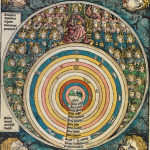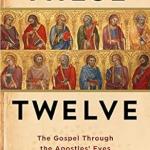
My uncle died a few weeks before Easter last year, an uncle who lived a complicated life wrought with struggle and isolating mental illness. Given the difficult task of planning a way to commemorate his life, my mom called to ask me if I would be the one to officiate the services. Not only had I not spoken to my uncle in about two decades, but he was a paranoid alcoholic, an angry recluse who was estranged from his family. Officiate his funeral?! To say what exactly? His life seemed uncorrectable and reflecting on it gracefully sounded unachievable.
Jesus was close to Mary, Martha and their brother Lazarus. When Martha called out to the Lord because her brother was dying, He stayed away. He sat still for her heart break. He didn’t step in. He didn’t intervene. Not during trial and turmoil, sickness and sadness, not even at the last hour.
When Martha heard Jesus was finally coming, she set out to meet Him.
I wonder what must have been going through her mind as she made her disenchanted way towards the Lord?
I imagine she saw His frame from a long way off. I suppose she recognized His gait as He came nearer… and then nearer. Like me, would she have rehearsed a silver-tongued scene between the two of them where she was all at once breezy, yet razor sharp? Would she feign facetious concern about his time away with a casual, “How was your trip? No sand storms, I hope. Good time, was it? Healing strangers? Yeah, yeah, I heard, born blind. Hey listen, don’t worry, the one you loved, he asked for you several times, but we assured him you probably hadn’t heard he was so ill. The funeral was nice.”
I’m pretty sure, if I were Martha, my glare would have been arctic, and my smile would have been tight. My voice would have been measured with just the right amount of lilt so I could postulate compassion instead of calculation in case throwing a passive agressive temper tantrum with God all came crashing down. But that’s just me.
Martha and Mary, famously unalike, were actually quite respectful with Jesus and delivered the same statement, putting it to Him plainly, “If you would have come my brother wouldn’t have had to die.”
I read that and my heart breaks as I feel alongside them in this moment. The betrayal they must have experienced, certainly no longer able to pretend that Jesus simply didn’t get their message, but instead, He matter of factly chose not to answer it. Polite and courteous, but nuanced, behind their comment, I hear questions. “What’s the point now, Jesus? He’s already dead. I called for you days ago and we had a funeral without you. You wouldn’t even come. Are we friends or not? Are you a friend to me at all?”
Their response is familiar to me because death, pain, rejection, and frankly far less dramatic situations can all send me into a storm of questioning the Lord.
It has potential to go like this: God if you’re there… and if you love me… then…You’ll fix this situation for me.
Perhaps much like Martha and Mary, I think I know how the Lord can love me the best. I make a demand or beg for a solution and then I wait for Him to show up when I have suggested. And if He doesn’t? Well, He obviously didn’t hear me. He is obviously punishing me. He obviously doesn’t care.
Upon inspection I have learned that my demands aren’t really about my desires. Not really. My demands are more often about my desire to know that He cares. What I am after is proof that Jesus will show up if I ask Him to. That would mean He is willing to involve Himself in my daily life in a way that matters to me, that He loves me in a way I understand as love.
I use demands as a strategy to try to find out who I am dealing with.
Are you a friend to me at all?
In my attempt to find out who I am dealing with, I look for ways to see and touch God’s devotion. And there seems to be something about my humanity that insists on measuring His devotion my very own way.
In John’s gospel, even though God’s word reads contradictorily and Jesus’ actions seem inconsistent– He loved him so he stayed two days longer— I simply have to trust that Jesus always reconciles.
True, Jesus isn’t explaining Himself gently over lunch. But during His silent moments can I still wait and trust that if God isn’t rushing to heal, then there must something to gain from the hurt? Can I lean into the uncomplicated parts of His character when I am confounded and trust that even if He is slow in coming, He is still coming?
Because if God is good, could I ever know how good? If God is powerful, is it possible for me to know how powerful?
Mary and Martha trusted Jesus but only minimally when He countered their expectations. And it wasn’t just his kindness they questioned. They were skeptical of His power, too.
When Jesus tells Martha her brother will rise again, Martha acknowledges what she believes Jesus is capable of in the heavenly realms, on His turf, where He is at home. “I know that he will rise again in the resurrection on the last day,” she says. But Martha couldn’t fully acknowledge the extent of Jesus’ power in the here and now. She trusted Jesus to do godly things in godly ways, but in the midst of their humanity? No way. In the thick of their four day stench? She couldn’t conceive it.
“Take me there,” He says. “Remove the barrier”.
Jesus asked her if she believed. And then He raised Lazarus healed.
This story makes me feel a lot. Some parts make me angry. Other parts make me sad. But when I consider everyone’s shock after the resurrection? Now that’s just fun. Maybe it’s what led up to the dramatic scene. Of course, there’s Mary and Martha frantically trying to guess the workings of the Lord and feeling abandoned when they don’t get it right. Then there’s doubting Thomas wanting to die along with Lazarus. For what, solidarity? No one is able to make sense of Jesus’ tears if he loved Lazarus so. Lastly, Martha is insistent that perhaps four days of what death can do to a body is beyond the Lord. All of their confusion, their wobbly human faith, their doubt, their suspicion– the whole thing; it’s chaos!
And then there’s Jesus. He arrives with calculation, compassion, power and divinty. He allows His heart to break and then thanks God for answering His prayer before He even prayed it.
So controlled.
Humanity verses Divinity. Such disparate responses in the throes of loss.
And it is glorious! All of it. We are told that it is so. “This is for the glory of God.”
I think the lesson is accepting our lives, welcoming them wholly, and in a way consenting to the external events that confront us knowing that drawing good out of good and bad out of bad is something easily managed. But drawing good out of evil? It is something only God can do in His love and wisdom.
Our only job is to believe that it is so. The raising of Lazarus invites us to this profound degree of trust. Do you believe? That’s what Jesus wanted to know.
We buried my uncle that day in the Spring.
His troubles made up most of his life and there was really no way to account for his time here on earth without mentioning them. As we gathered together, six people who tried to love him anyway, we stared at our feet and silently wondered if all was lost, if it was far too late. We wrung our hands ready to give up and accept death. As mourners we sought only to contain the ruin, or bury the loss. And as I stood there in front of our intimate crowd, looking at the readings for that day, it became clear that the only story to tell was the story of Lazarus. We grieved and read and learned that Jesus is coming, coming to heal no matter the shambles and despite the turmoil. We held hands and felt hope that there is no estrangement, no addiction, no mental illness, no disease, no death, nothing in heaven or on earth that can place the world or anyone in it outside of God’s redemption.
When Jesus heals our scrapes, our minor bumps and bruises, it’s a delight, an enchantment, a novelty. But when He takes us to our furthest edge to just pull us back again, when He literally brings us back to life, we’re undone to see even more of His power.
Lazarus’s resurrection foreshadowed His own. We are privileged to know beyond question that death has nothing on our God who specializes in restoration, redemption and resurrection.
I can’t. I can’t. I can’t.
 Allison M. Sullivan is the author of the essay collection Rock, Paper, Scissors. She lives in Bryan, Texas, with her husband, Seth, and their four children, Sylas, Amelia, Blaise, and Wren. While in the trenches of motherhood, she’s currently applying her degrees in special education and cynology outside of the classroom. She is on the board of Elizabeth House Maternity Home and teaches a re-entry course at a women’s prison. She also teaches yoga.
Allison M. Sullivan is the author of the essay collection Rock, Paper, Scissors. She lives in Bryan, Texas, with her husband, Seth, and their four children, Sylas, Amelia, Blaise, and Wren. While in the trenches of motherhood, she’s currently applying her degrees in special education and cynology outside of the classroom. She is on the board of Elizabeth House Maternity Home and teaches a re-entry course at a women’s prison. She also teaches yoga.















